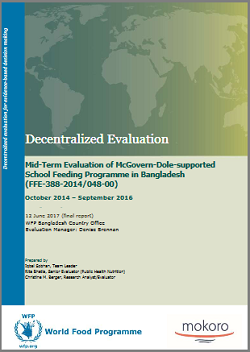
It was intended for both accountability and learning and focuses on assessing: i) the relevance, effectiveness (potential impact), efficiency, sustainability and coherence. It also assess the performance of the programme and associated interventions.
The evaluations assessed the School Feeding (SF) activities for about 163,000 primary school pupils in one northern district (Gaibandha). It has wider educational and nutritional objectives and therefore also provides support for various activities to raise community awareness and support the quality of education. It contributes, along with other agencies, to an "essential learning package" that links education, school health, nutrition and hygiene; it also aims to support the strengthening of a national SF strategy.
The evaluation, which makes a number of recommendations for the future, was managed by the Regional Bureau for Asia and the Pacific and conducted by Mokoro, with fieldwork taking place in November to December 2016.
